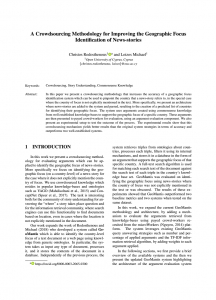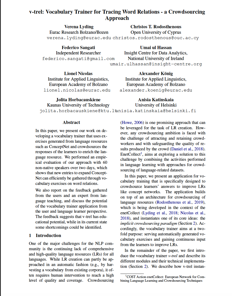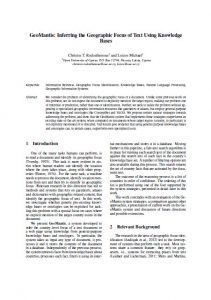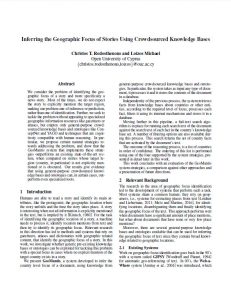ORCID | DBLP | Scopus | Google Scholar | ResearchGate | Web Of Science | Semantic Scholar | MathSciNet
2021 |
|
 | Rodosthenous, Christos; Michael, Loizos A Crowdsourcing Methodology for Improved Geographic Focus Identification of News-Stories Proceedings Article In: Proceedings of the 13th International Conference on Agents and Artificial Intelligence, 2021. Abstract | BibTeX | Tags: crowdsourcing, Geographic Focus Identification, Information Retrieval, Natural Language Processing | Links: @inproceedings{rodosthenous2021,Past work on the task of identifying the geographic focus of news-stories has established that state-of-the-art performance can be achieved by using existing crowdsourced knowledge-bases. In this work we demonstrate that a further refinement of those knowledge-bases through an additional round of crowdsourcing can lead to improved performance on the aforementioned task. Our proposed methodology views existing knowledge-bases as collections of arguments in support of particular inferences in terms of the geographic focus of a given news-story. The refinement that we propose is to associate these arguments with weights --- computed through crowdsourcing --- in terms of how strongly they support their inference. The empirical results that we present establish the superior performance of this approach compared to the one using the original knowledge-base. |
2019 |
|
 | Lyding, Verena; Rodosthenous, Christos; Sangati, Federico; ul Hassan, Umair; Nicolas, Lionel; König, Alexander; Horbacauskiene, Jolita; Katinskaia, Anisia v-trel: Vocabulary Trainer for Tracing Word Relations - An Implicit Crowdsourcing Approach Proceedings Article In: Angelova, Galia; Mitkov, Ruslan; Nikolova, Ivelina; Temnikova, Irina (Ed.): Proceedings of the International Conference Recent Advances in Natural Language Processing, RANLP 2019, pp. 675-684, Varna, Bulgaria, 2019. Abstract | BibTeX | Tags: ConceptNet, crowdsourcing, Language learning, Natural Language Processing | Links: @inproceedings{lyding:2019:RANLP,In this paper, we present our work on developing a vocabulary trainer that uses exercises generated from language resources such as ConceptNet and crowdsources the responses of the learners to enrich the language resource. We performed an empirical evaluation of our approach with 60 non-native speakers over two days, which shows that new entries to expand ConceptNet can efficiently be gathered through vocabulary exercises on word relations. We also report on the feedback gathered from the users and an expert from language teaching, and discuss the potential of the vocabulary trainer application from the user and language learner perspective. The feedback suggests that v-trel has educational potential, while in its current state some shortcomings could be identified. |
2018 |
|
 | Rodosthenous, Christos; Michael, Loizos GeoMantis: Inferring the Geographic Focus of Text using Knowledge Bases Proceedings Article In: Rocha, Ana Paula; van den Herik, Jaap (Ed.): Proceedings of the 10th International Conference on Agents and Artificial Intelligence (ICAART2018), 2018. Abstract | BibTeX | Tags: Geographic Focus Identification, Geographic Information Systems, Information Retrieval, Knowledge Bases, Natural Language Processing | Links: @inproceedings{Rodosthenous2018,We consider the problem of identifying the geographic focus of a document. Unlike some previous work on this problem, we do not expect the document to explicitly mention the target region, making our problem one of inference or prediction, rather than one of identification. Further, we seek to tackle the problem without appealing to specialized geographic information resources like gazetteers or atlases, but employ general-purpose knowledge bases and ontologies like ConceptNet and YAGO. We propose certain natural strategies towards addressing the problem, and show that the GeoMantis system that implements these strategies outperforms an existing state-of-the-art system, when compared on documents whose target region (country, in particular) is not explicitly mentioned or is obscured. Our results give evidence that using general-purpose knowledge bases and ontologies can, in certain cases, outperform even specialized tools. |
2017 |
|
 | Rodosthenous, Christos; Michael, Loizos Inferring the Geographic Focus of Stories Using Crowdsourced Knowledge Bases Workshop Cognition and Artificial Intelligence for Human-Centred Design (CAID2017), 2017. Abstract | BibTeX | Tags: Geographic Focus Identification, Geographic Information Systems, Information Retrieval, Knowledge Bases, Natural Language Processing @workshop{Rodosthenous2018b,We consider the problem of identifying the geographic focus of a story and more specifically a news story. Most of the times, we do not expect the story to explicitly mention the target region, making our problem one of inference or prediction, rather than one of identification. Further, we seek to tackle the problem without appealing to specialized geographic information resources like gazetteers or atlases, but employ only general-purpose crowdsourced knowledge bases and ontologies like ConceptNet and YAGO and techniques that are cognitively compatible with human reasoning. In particular, we propose certain natural strategies towards addressing the problem, and show that the GeoMantis system that implements these strategies outperforms an existing state-of-the-art system, when compared on stories whose target region (country, in particular) is not explicitly mentioned or is obscured. Our results give evidence that using general-purpose crowdsourced knowledge bases and ontologies can, in certain cases, outperform even specialized tools. |
